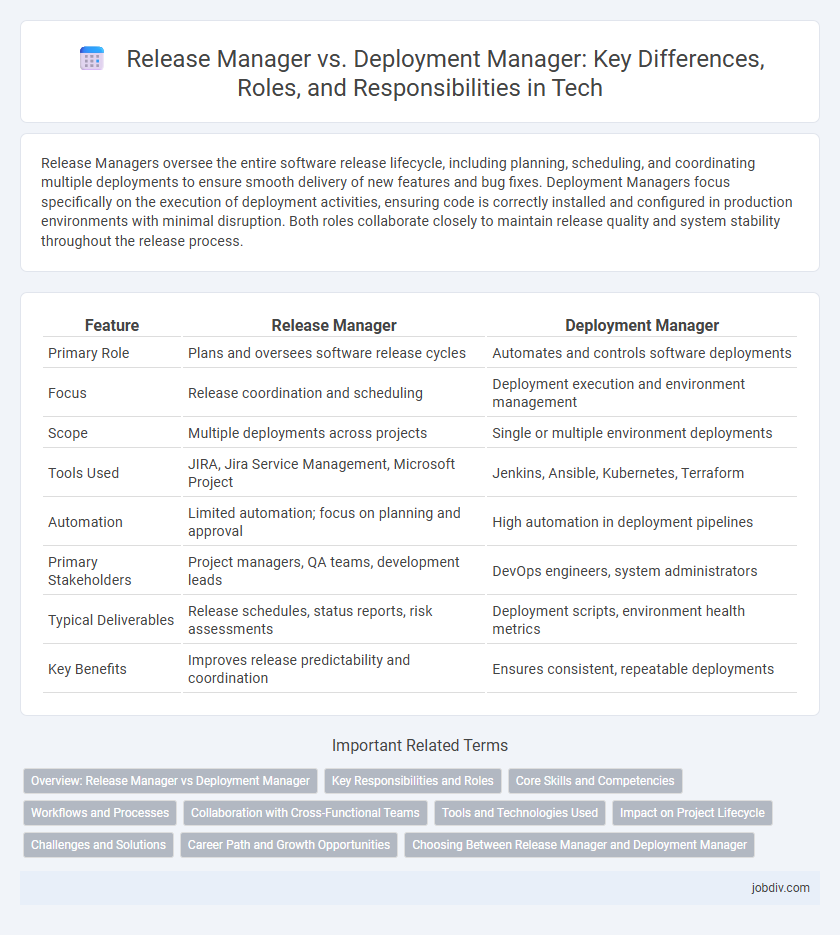Release Managers oversee the entire software release lifecycle, including planning, scheduling, and coordinating multiple deployments to ensure smooth delivery of new features and bug fixes. Deployment Managers focus specifically on the execution of deployment activities, ensuring code is correctly installed and configured in production environments with minimal disruption. Both roles collaborate closely to maintain release quality and system stability throughout the release process.
Table of Comparison
| Feature | Release Manager | Deployment Manager |
|---|---|---|
| Primary Role | Plans and oversees software release cycles | Automates and controls software deployments |
| Focus | Release coordination and scheduling | Deployment execution and environment management |
| Scope | Multiple deployments across projects | Single or multiple environment deployments |
| Tools Used | JIRA, Jira Service Management, Microsoft Project | Jenkins, Ansible, Kubernetes, Terraform |
| Automation | Limited automation; focus on planning and approval | High automation in deployment pipelines |
| Primary Stakeholders | Project managers, QA teams, development leads | DevOps engineers, system administrators |
| Typical Deliverables | Release schedules, status reports, risk assessments | Deployment scripts, environment health metrics |
| Key Benefits | Improves release predictability and coordination | Ensures consistent, repeatable deployments |
Overview: Release Manager vs Deployment Manager
A Release Manager oversees the entire software release lifecycle, including planning, scheduling, and coordinating all phases to ensure smooth delivery of new features and updates. Deployment Managers focus specifically on the technical execution of deploying software into production environments, managing configurations, and ensuring systems operate correctly post-deployment. Both roles collaborate closely to maintain release integrity, minimize downtime, and optimize continuous integration and delivery pipelines.
Key Responsibilities and Roles
Release Managers coordinate the planning, scheduling, and control of software builds and deployments across development, testing, and production environments to ensure seamless release cycles. Deployment Managers focus on the actual implementation and installation of software releases, managing deployment processes, rollbacks, and environment configurations to guarantee successful delivery. Both roles collaborate closely to optimize release timelines, maintain quality standards, and reduce deployment risks.
Core Skills and Competencies
Release Managers excel in coordinating software development cycles, possessing strong skills in version control, risk management, and stakeholder communication to ensure seamless product releases. Deployment Managers specialize in orchestration of deployment pipelines, infrastructure automation, and troubleshooting, emphasizing expertise in CI/CD tools, server configuration, and rollback procedures. Both roles require proficiency in project management and collaboration, but Release Managers prioritize release strategy while Deployment Managers focus on technical execution and environment stability.
Workflows and Processes
Release Managers coordinate overall software release workflows, managing version control, integration, and release scheduling to ensure seamless delivery across multiple teams. Deployment Managers focus specifically on deployment processes, overseeing environment readiness, deployment automation, and post-deployment validation to guarantee stable and efficient application rollout. Both roles require close collaboration, but Release Managers handle broader release lifecycle orchestration while Deployment Managers execute precise deployment steps within defined workflows.
Collaboration with Cross-Functional Teams
Release Managers coordinate with development, QA, and product teams to plan and schedule releases, ensuring alignment on feature readiness and quality standards. Deployment Managers work closely with operations, infrastructure, and support teams to manage the technical deployment process, minimizing downtime and maintaining system stability. Effective collaboration between these roles bridges the gap between release planning and execution, enhancing overall delivery efficiency.
Tools and Technologies Used
Release Managers leverage tools like Jira, Jenkins, and Git for orchestrating software release cycles, emphasizing version control and automated build processes. Deployment Managers utilize configuration management and automation platforms such as Ansible, Puppet, and Kubernetes to ensure seamless application deployment and environment consistency. Both roles require expertise in CI/CD pipelines, but Release Managers focus on release scheduling while Deployment Managers prioritize infrastructure and runtime stability.
Impact on Project Lifecycle
Release Managers oversee the coordination and scheduling of software releases, ensuring alignment with project milestones and stakeholder expectations to minimize risks and downtime. Deployment Managers focus on the technical execution of deploying software into production environments, emphasizing stability, configuration, and rollback procedures. The collaboration between these roles directly impacts project lifecycle efficiency by streamlining delivery timelines and maintaining system integrity.
Challenges and Solutions
Release Managers face challenges in coordinating multiple teams and managing complex release schedules, while Deployment Managers struggle with ensuring seamless environment transitions and minimizing downtime. Effective solutions involve implementing automated workflows, robust communication tools, and continuous integration pipelines to enhance collaboration and reduce errors. Leveraging metrics and feedback loops supports proactive issue resolution, optimizing both release velocity and deployment stability.
Career Path and Growth Opportunities
Release Managers often progress into roles like Program Manager or Product Manager due to their involvement in cross-functional coordination and strategic planning. Deployment Managers typically advance toward specialized positions such as DevOps Engineer or Infrastructure Manager, leveraging their expertise in system deployment and automation. Both career paths offer growth opportunities in leadership and technical domains, with Release Managers focusing on end-to-end release deliverables and Deployment Managers emphasizing operational efficiency and system reliability.
Choosing Between Release Manager and Deployment Manager
Choosing between a Release Manager and a Deployment Manager depends on the scope of responsibilities within the software delivery lifecycle. Release Managers oversee planning, scheduling, and coordinating multiple deployments to ensure a smooth and risk-mitigated release process, while Deployment Managers focus on the technical execution and automation of deploying software to production environments. Organizations with complex, multi-component releases benefit from a dedicated Release Manager, whereas teams emphasizing streamlined, repeatable deployment tasks may prioritize a Deployment Manager role.
Release Manager vs Deployment Manager Infographic

 jobdiv.com
jobdiv.com